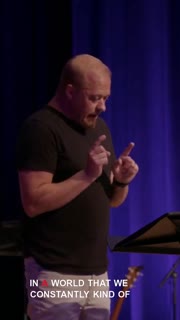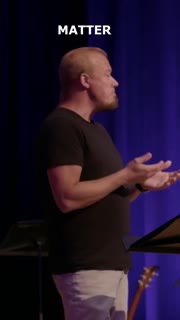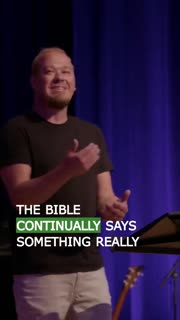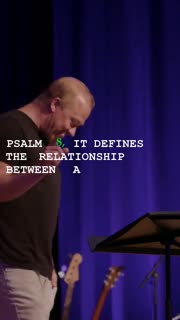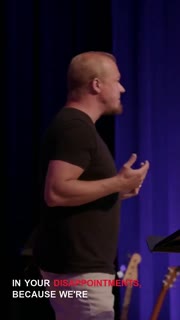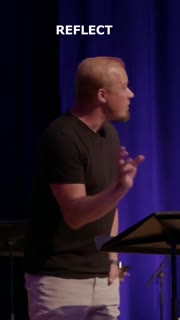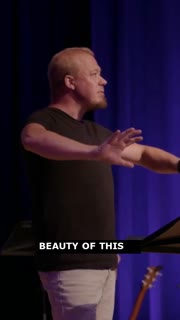Restoring Our Relationship with God Through Psalm 8
Devotional
Sermon Summary
Bible Study Guide
Sermon Clips
### Quotes for Outreach
1. "I know now more than ever, like any time in this existence of this country, like the church, us as disciples of Jesus, we're going to need to display like a different way. It's the way of Jesus, right? That condemns violence, that values all humanity. It's the ones who know that the true battle, it's not against flesh and blood, but it's against the power, the powers and the principalities, the spiritual realms of this world." [02:17] (37 seconds)
2. "In a world that we constantly kind of make a attempt at trying to find answers to things like relationship with God, existence of God, what is our connection to this higher power, whatever it is, pondering things in our minds, like, why are we here, right? What's the purpose of this? And what does it look like to exist within this experience of being with a creator?" [10:38] (30 seconds)
3. "We matter to God. Humanity, we matter to God. We do. And yet, we aren't the only thing that matters to God. It's a both-and with God, right? Remember, God isn't man-centric, but He's also pro-life. He desires for man to have life, for that life to be lived in His presence. Like, it's true. So we matter. We've been given a role. However, we aren't all that matters." [35:38] (36 seconds)
4. "Our role is to be loved. It's to be cared for by the Creator, right? God, He delights in His image bearers. It's true. And our role is to receive, is to receive that love, receive that care, and to respond, to respond in worship and adoration, right? So refining this role as caregiver and entrusting that even if our circumstances feel hard, even if they feel really unfair, which I know there's a lot of those situations, well, that God hasn't given up on His creation, that He actually does care." [37:03] (38 seconds)
5. "The Bible continually says something really important about the character of God. It says he's abounding. He's the word abounding, right? Look at Exodus, the Lord, the Lord of God, merciful and gracious, slow to anger, abounding in steadfast love and faithfulness. So that means he doesn't run out of mercy. He doesn't run out of grace. But the reality is, when we come to understand his level of care, his level of forgiveness, well, what that should do, that should humble us. That should humble us to want to change, to want to walk in obedience, to want to follow his command, to follow the way of Jesus." [41:37] (37 seconds)
### Quotes for Members
1. "Psalm 8, it defines the relationship between a creator and this creation man, right? And if you're not familiar with this term, define the relationship, I'll give you a little bit of some context to it. Maybe it's you've been spending time with an individual, and maybe you're kind of unsure, like hanging out a lot, not sure where you stand in this whole time together. There's like, is this friend zone? Is this like future spouse? What is this? And the question comes up, well, we need to define this relationship, right? We need to DTR." [09:00] (34 seconds)
2. "When we operate in a healthy knowledge of who God is, and we operate in a healthy understanding of who we are in light of the knowledge of who God is, what I think that does is I truly believe that leads to what we see as this abundant life, right? This abundant life that Jesus calls us towards, right? We live and we walk in a life of abundance. That's what we experience." [12:16] (30 seconds)
3. "In your disappointments, because we're all going to have them, in your doubts, your struggles to understand, here's what I would encourage. I think it's important to try to stay away from critique, but to actually look to seek, like, to seek. See, Jesus tells his disciples, he says something really valuable. He says, seek first, and then what he says, all these things will be added. Now, listen, sometimes we take that all these things and we're like, oh, all these material possessions, all these things like that. That's not what he's saying. I think more all is, is all we need to know is found in his character. And the more we seek him, the more we know who he is." [30:23] (40 seconds)
4. "The righteousness we reflect is what God in Christ has imputed upon us, has gifted to us. It's Christ's work on our behalf. Paul talks about this reality. And earlier in Romans, he says this, The righteousness of God through faith in Jesus Christ for all who believe. For there's no distinction. We've all sinned and fall short of the glory of God and are justified by his grace as a gift through the redemption that is in Christ Jesus, whom God put forward as a propitiation by his blood to be received by faith." [43:07] (30 seconds)
5. "Ultimately the beauty of this relationship with God, it's refined and restored through the gospel. It's this gift of the gospel of giving what we don't deserve, but yet God so freely gives because God is mindful of us. Just like the psalm says, he offers us grace. He offers us mercy. He offers us Christ's work on our behalf. He defines this relationship now as forgiven. As forgiven. We're not equal. It's not dumb. It's but forgiven. And I think when we come to understand that new reality of this relational space, I think it transforms who we are and it changes us." [44:37] (48 seconds)
Ask a question about this sermon
1. "I know now more than ever, like any time in this existence of this country, like the church, us as disciples of Jesus, we're going to need to display like a different way. It's the way of Jesus, right? That condemns violence, that values all humanity. It's the ones who know that the true battle, it's not against flesh and blood, but it's against the power, the powers and the principalities, the spiritual realms of this world." [02:17] (37 seconds)
2. "In a world that we constantly kind of make a attempt at trying to find answers to things like relationship with God, existence of God, what is our connection to this higher power, whatever it is, pondering things in our minds, like, why are we here, right? What's the purpose of this? And what does it look like to exist within this experience of being with a creator?" [10:38] (30 seconds)
3. "We matter to God. Humanity, we matter to God. We do. And yet, we aren't the only thing that matters to God. It's a both-and with God, right? Remember, God isn't man-centric, but He's also pro-life. He desires for man to have life, for that life to be lived in His presence. Like, it's true. So we matter. We've been given a role. However, we aren't all that matters." [35:38] (36 seconds)
4. "Our role is to be loved. It's to be cared for by the Creator, right? God, He delights in His image bearers. It's true. And our role is to receive, is to receive that love, receive that care, and to respond, to respond in worship and adoration, right? So refining this role as caregiver and entrusting that even if our circumstances feel hard, even if they feel really unfair, which I know there's a lot of those situations, well, that God hasn't given up on His creation, that He actually does care." [37:03] (38 seconds)
5. "The Bible continually says something really important about the character of God. It says he's abounding. He's the word abounding, right? Look at Exodus, the Lord, the Lord of God, merciful and gracious, slow to anger, abounding in steadfast love and faithfulness. So that means he doesn't run out of mercy. He doesn't run out of grace. But the reality is, when we come to understand his level of care, his level of forgiveness, well, what that should do, that should humble us. That should humble us to want to change, to want to walk in obedience, to want to follow his command, to follow the way of Jesus." [41:37] (37 seconds)
### Quotes for Members
1. "Psalm 8, it defines the relationship between a creator and this creation man, right? And if you're not familiar with this term, define the relationship, I'll give you a little bit of some context to it. Maybe it's you've been spending time with an individual, and maybe you're kind of unsure, like hanging out a lot, not sure where you stand in this whole time together. There's like, is this friend zone? Is this like future spouse? What is this? And the question comes up, well, we need to define this relationship, right? We need to DTR." [09:00] (34 seconds)
2. "When we operate in a healthy knowledge of who God is, and we operate in a healthy understanding of who we are in light of the knowledge of who God is, what I think that does is I truly believe that leads to what we see as this abundant life, right? This abundant life that Jesus calls us towards, right? We live and we walk in a life of abundance. That's what we experience." [12:16] (30 seconds)
3. "In your disappointments, because we're all going to have them, in your doubts, your struggles to understand, here's what I would encourage. I think it's important to try to stay away from critique, but to actually look to seek, like, to seek. See, Jesus tells his disciples, he says something really valuable. He says, seek first, and then what he says, all these things will be added. Now, listen, sometimes we take that all these things and we're like, oh, all these material possessions, all these things like that. That's not what he's saying. I think more all is, is all we need to know is found in his character. And the more we seek him, the more we know who he is." [30:23] (40 seconds)
4. "The righteousness we reflect is what God in Christ has imputed upon us, has gifted to us. It's Christ's work on our behalf. Paul talks about this reality. And earlier in Romans, he says this, The righteousness of God through faith in Jesus Christ for all who believe. For there's no distinction. We've all sinned and fall short of the glory of God and are justified by his grace as a gift through the redemption that is in Christ Jesus, whom God put forward as a propitiation by his blood to be received by faith." [43:07] (30 seconds)
5. "Ultimately the beauty of this relationship with God, it's refined and restored through the gospel. It's this gift of the gospel of giving what we don't deserve, but yet God so freely gives because God is mindful of us. Just like the psalm says, he offers us grace. He offers us mercy. He offers us Christ's work on our behalf. He defines this relationship now as forgiven. As forgiven. We're not equal. It's not dumb. It's but forgiven. And I think when we come to understand that new reality of this relational space, I think it transforms who we are and it changes us." [44:37] (48 seconds)

